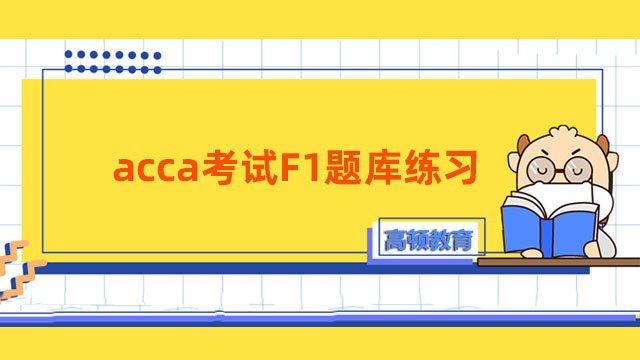2014年ACCA《公司法与商法》真题及答案三
来源:
高顿网校
2015-07-20
高顿小编为各位ACCA学员整理了历年考试真题,希望大家查漏补缺,对考试有所帮助。
Question:
Question:
In relation to the TORT OF NEGLIGENCE, explain:
(a)the standard of care owed by one person to another;
(b)remoteness of damage.
Answer:
(a)The law does not require unreasonable steps to be taken to avoid breaching a duty of care. In legal terms, a breach of duty of care occurs if the defendant fails:
'…… to do something which a reasonable man, guided upon those considerations which ordinarily regulate the conduct of human affairs, would do; or doing something which a prudent and reasonable man would not do.' (Blyth v BirminghamWaterworks Co (1856))
Thus the fact that the defendant has acted less skilfully than the reasonable person would expect will usually result in a breach being established. This is the case even where the defendant is inexperienced in their particular trade or activity. For example, a learner driver must drive in the manner of a driver of skill, experience and care (Nettleship v Weston (1971)). However, the standard of care expected from a child may be lower than that of an adult (Mullin v Richards (1998)).
Clearly the degree, or standard, of care to be exercised by such a reasonable person will vary depending on circumstances, but the following factors will be taken into consideration in determining the issue:
(i)The seriousness of the risk
The degree of care must be balanced against the degree of risk involved if the defendant fails in their duty. It follows, therefore, that the greater the risk of injury or the more likely it is to occur, the more the defendant will have to do to fulfil their duty. The degree of care to be exercised by the defendant may be increased if the claimant is very young, old or less able bodied in some way. The rule is that 'you must take your victim as you find him' (this is known as the egg-shell skull rule).
In Haley v London Electricity Board (1965) the defendants, in order to carry out repairs, had made a hole in the pavement. The precautions taken by the Electricity Board were sufficient to safeguard a sighted person, but Haley, who was blind, fell into the hole, striking his head on the pavement, and became deaf as a consequence. It was held that the Electricity Board was in breach of its duty of care to pedestrians. It had failed to ensure that the excavation was safe for all pedestrians, not just sighted persons. It was clearly not reasonably safe for blind persons, yet it was foreseeable that they might use the pavement.
The degree of risk has to be balanced against the social utility and importance of the defendant's activity. For example, in Watt v Hertfordshire CC (1954), the injury sustained by the plaintiff, a fireman, whilst getting to an emergency situation, was not accepted as being the result of a breach of duty of care as, in the circumstances, time was not available to take the measures which would have removed the risk.
(ii)Cost and practicability
Any foreseeable risk has to be balanced against the measures necessary to eliminate it. If the cost of these measures far outweighs the risk, the defendant will probably not be in breach of duty for failing to carry out those measures (Latimer v AEC Ltd (1952)).
(iii)Skilled persons
Individuals who hold themselves out as having particular skills are not judged against the standard of the reasonable person, but the reasonable person possessing the same professional skill as they purport to have (Roe v Minister of Health (1954)).
(b)The position in negligence is that the person ultimately liable in damages is only responsible to the extent that the loss sustained was considered not to be too remote. The test for remoteness was established in The Wagon Mound (No 1) (1961).
The defendants negligently allowed furnace oil to spill from a ship into Sydney harbour, which subsequently caused a fire, which spread to, and damaged, the plaintiff's wharf. Although the defendants were held to be in breach of their duty of care, they were only liable for the damage caused to the wharf and slipway through the fouling of the oil. They were not liable for the damage caused by fire because damage by fire was at that time unforeseeable (the oil had a high ignition point and it could not be foreseen that it would ignite on water).
The test of reasonable foresight arising out of The Wagon Mound clearly takes into account such things as scientific knowledge at the time of the negligent act. The question to be asked in determining the extent of liability is, 'is the damage of such a kind as the reasonable [person] should have foreseen?' This does not mean that the defendant should have foreseen precisely the sequence or nature of the events.
This is illustrated in the case of Hughes v Lord Advocate (1963), where employees of the Post Office, who were working down a manhole, left it without a cover but with a tent over it and lamps around it. A child picked up a lamp and went into the tent. He tripped over the lamp, knocking it into the hole. An explosion occurred and the child was burned. The risk of the child being burned by the lamp was foreseeable. However, the vaporisation of the paraffin in the lamp and its ignition were not foreseeable. It was held that the defendants were liable for the injury to the plaintiff. It was foreseeable that the child might be burned and it was immaterial that neither the extent of his injury nor the precise chain of events leading to it was foreseeable.
高顿网校温馨提醒
各位考生,2015年ACCA备考已经开始,为了方便各位学员能更加系统地掌握考试大纲的重点知识,帮助大家充分备考,体验实战,高顿网校开通了全免费的ACCA题库(包括精题真题和全真模考系统),题库里附有详细的答案解析,学员可以通过多种题型加强练习。戳这里进入ACCA免费题库>>>
| ACCA网络课程 | 课程专业名称 | 讲师 | 试听 |
 85%的人正在学习该课程 85%的人正在学习该课程 | ACCA 全维度网课体验课程 实景课堂与独立录制 覆盖所有知识点,根据学习计划推进学习进度 | 高顿名师 |  |
 70%的人正在学习该课程 70%的人正在学习该课程 | ACCA网课全科卡(8.2折) 为零基础刚开始学习ACCA的学员特别定制 | 高顿名师 |  |
精彩推荐:
版权声明:本条内容自发布之日起,有效期为一个月。凡本网站注明“来源高顿教育”或“来源高顿网校”或“来源高顿”的所有作品,均为本网站合法拥有版权的作品,未经本网站授权,任何媒体、网站、个人不得转载、链接、转帖或以其他方式使用。
经本网站合法授权的,应在授权范围内使用,且使用时必须注明“来源高顿教育”或“来源高顿网校”或“来源高顿”,并不得对作品中出现的“高顿”字样进行删减、替换等。违反上述声明者,本网站将依法追究其法律责任。
本网站的部分资料转载自互联网,均尽力标明作者和出处。本网站转载的目的在于传递更多信息,并不意味着赞同其观点或证实其描述,本网站不对其真实性负责。
如您认为本网站刊载作品涉及版权等问题,请与本网站联系(邮箱fawu@gaodun.com,电话:021-31587497),本网站核实确认后会尽快予以处理。
点一下领资料
【整理版】ACCA各科目历年真题
真题高频考点,刷题全靠这份资料
下载合集
acca全科学习思维导图
梳理核心考点,一图看懂全部章节
下载合集
2023年acca考纲解析
覆盖科目重难点,备考按照计划走
下载合集
acca备考 热门问题解答
- acca考试怎么搭配科目?
-
建议优先选择相关联的科目进行搭配报考,这样可以提高备考效率,减轻备考压力,1、F1-F4:为随时机考科目,难度较低,这里可以自行随意选择考试顺序。2、F5-F9:如果你的工作的和财务会计或者审计有关、或者你比较擅长财务和审计的话,推荐先考F7和F8。你可以选择一起考ACCA考试科目F7和F8或者先考F7(8)再考F8(7),这就要取决你一次想考几门。3、P阶段:选修科目中,建议企业首选AFM!第二部分科目进行选择,如果AA和SBR掌握学生更好,可以通过选择AAA,如果SBL掌握的好,可以自己选择APM。
- acca一共几门几年考完?
-
acca一共有15门考试科目,其中有必修科目和选修科目,考生需要考完13门科目才能拿下证书。
- acca一年考几次?
-
acca一年有4次考试,分别是3月、6月、9月和12月,分季机考科目是采取的这类四个考季的模式,而随时机考则是没有这方面的时间规定限制,可以随报随考。
- acca的含金量如何?
-
ACCA证书的含金量是比较高的,从就业、能力提升、全球认可等角度来说,都是比较有优势的证书,其含金量主要表现在以下几个方面:1、国际化,认可度高;2、岗位多,就业前景好;3、缺口大,人才激励。
严选名师 全流程服务
其他人还搜了
热门推荐
-
acca考试F1题库练习,考生必备! 2023-03-20
-
acca2022真题下载流程介绍,必做考前模考题! 2023-02-24
-
ACCA试卷出题形式?ACCA考试最快多久能通过? 2021-07-24
-
ACCA官方样题 F4(ENG) F8 2021-01-07
-
ACCA考试P1-P3模拟题及解析9 2021-01-07
-
四大会计事务所2017年终精华会评(中) 2018-02-01
-
2016年ACCA F1模拟练习题及答案 2016-02-29
-
2016年ACCA F8每日一练:Professional ethics 2016-01-26
-
2016ACCA考试F8自测题:Corporate governance 2016-01-26
-
关于ACCA考试P7中的专业和道德问题 2015-11-24
-
ACCA P5精选模拟题之战略性绩效考核 2015-10-10
-
ACCA F9模拟测试题之投资评估 2015-10-10
-
ACCA P3精选练习题之战略管理和组织变革 2015-10-10
-
2014年ACCA《公司法与商法》真题及答案七 2015-07-20
-
2014年ACCA《公司法与商法》真题及答案七 2015-07-20
-
2014年ACCA《公司法与商法》真题及答案六 2015-07-20
-
2014年ACCA《公司法与商法》真题及答案五 2015-07-20
-
2014年ACCA《公司法与商法》真题及答案四 2015-07-20
-
2014年ACCA《公司法与商法》真题及答案二 2015-07-20
-
2014年ACCA《公司法与商法》真题及答案一 2015-07-20
-
2014年ACCA《公司法与商法》真题及答案八 2015-07-20
-
2015年ACCA考试模拟题 2015-06-26
-
2015年ACCA考试精选测试题汇总 2015-06-19
-
2015年ACCA考试《财务成本管理》模拟题汇总 2015-06-18
-
2015年ACCA考试F8模拟试题:Financial Management 2015-06-18
-
ACCA考试2015年《财务成本管理》模拟练习汇总 2015-04-27
-
ACCA考试2015年《财务成本管理》模拟练习5 2015-04-27
-
ACCA考试2015年《财务成本管理》模拟练习4 2015-04-27
 更多服务
更多服务

















